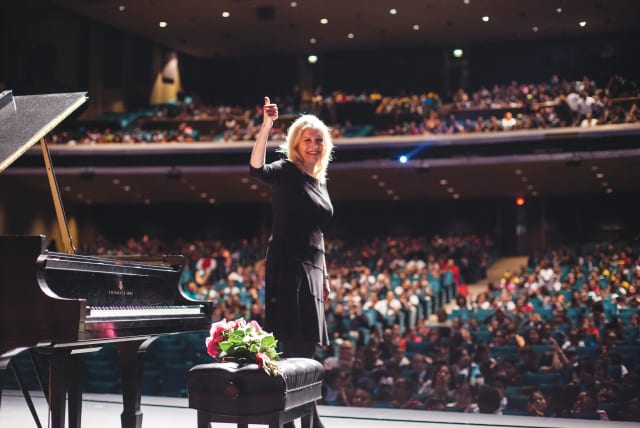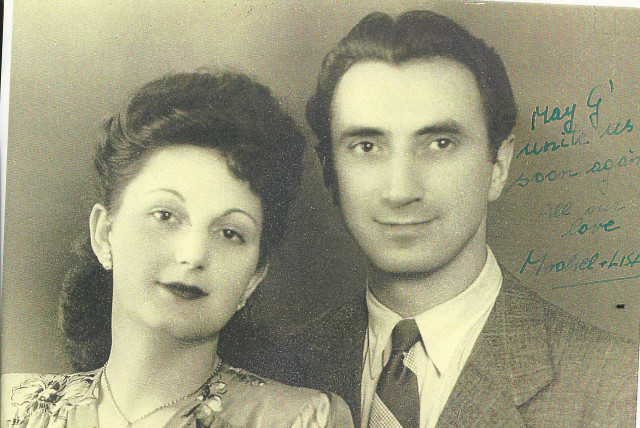Mona Golabek is a woman on a mission.
The word she has been spreading through her music and her mother’s life story for the past two-plus decades is of a decidedly uplifting, emotive, and inspiring nature.
A couple of weeks ago, the Los Angeles-based Grammy-nominated classical pianist came to Israel at the behest of the ANU Museum in Tel Aviv to unveil her one-woman show, The Pianist of Willesden Lane, and to dispense free copies of the book she wrote about her mother, Lisa Jura.
We all have our own ways of coping with personal loss and final and irrevocable separation. Some manage better than others, either by dint of having a close loving support group at hand or being blessed with some innate strength and an indomitable will to live.
Jura had the latter, but she also had the immeasurable boon of music. Her talent at the piano was initially nurtured by her mother, Malka, and subsequently by her beloved teacher Prof. Isseles. That Jura was destined for great things appeared to have been on the cards.
But that was in 1930s Vienna, during the darkest of times for the Jura family, living in the Austrian capital’s Second District, home to many Jews, my own mother’s family included.
Jura left for England on the Kindertransport – the British-sponsored rescue campaign – with just one compact suitcase, as per the Nazis’ dictates for all the approximately 10,000 kinder (children) who made it out of Nazi-occupied Europe between December 1938 and the beginning of World War II. Malka heroically sent her then 14-year-old daughter away, to survival, with another precious gift.
“You must promise me... that you will hold on to your music. Please promise me that,” Malka told her distraught daughter at the Westbahnhof as Jura waited to board the train to London. When the teenager protested that she wouldn’t be able to do that without her mother by her side, Malka insisted. “Your music will help you through – let it be your best friend, Liseleh. And remember that I love you.”
The mother-daughter exchange, before they parted forever, appears in The Children of Willesden Lane, a book written by Golabek in conjunction with Lee Cohen, which has been translated into numerous languages, including Hebrew, Arabic, Polish, and German.
It also forms the basis for The Pianist of Willesden Lane, which Golabek recently performed at the ANU Museum and at a number of local schools.
The visit here was sponsored by the Koret Foundation, Charles Bronfman, and the Leon Levy Foundation, with the venture supported globally by the USC Shoah Foundation, which helps Golabek spread the word of her mother’s story around the world. That generous underpinning also enables Golabek to offer free admission to the shows, as well as giving out copies of the book gratis.
Willesden Lane
The eponymous street is where Jura lived in London, in a hostel at number 243, run by a matronly figure named Mrs. Cohen, which housed 30 kinder. Jura kept her promise to her mother and stuck to her musical path.
That was helped by the fact that the hostel had an upright piano to which Jura had daily access. She played ferociously while the Luftwaffe pounded London during the Blitz, after the instrument had been relocated to the safety of the basement.
Golabek portrays her mother in the show, directed by Canadian pianist, actor, and playwright Hershey Felder, telling Jura’s tale as she tickles the ivories. That tallies with the way things worked out in reality. “She told me stories of her life through the music,” Golabek explains when we meet up in Jaffa. “She said that each piece of music tells a story. Through the music she taught me, I learned the story of her life.”
Against all odds, Jura succeeded in gaining entry to the prestigious Royal Academy of Music in London. After the war, after immigrating again, this time out of choice to the United States, she indeed became a concert pianist – albeit only briefly – and subsequently devoted her working hours to teaching others.
Her students included her two daughters, Mona and Renée. Today, Renée’s four children all play music. Lisa Jura’s genetic artistic legacy appears to be in robust joyous health.
Golabek is doing her utmost to do more than keep her mother’s life story alive. The show is a carefully crafted vehicle aimed at inspiring thousands of children and adults all over the world to stick to their principles and morals, seek out the truth, and combat discrimination and hatred. That is facilitated through The Willesden Project launched by Golabek’s fittingly named Hold On to Your Music Foundation.
The book subtitle reads Beyond the Kindertransport: A Memoir of Music, Love and Survival. Jura never let go of her music and she clearly survived, at least in a physical sense, although it is hard to know how the trauma of her enforced separation from her parents and the horrors she witnessed following the Anschluss and, in particular, on Kristallnacht affected her emotional well-being. But Jura, it seems, was made of sterner stuff. Both her sisters miraculously survived the war.
Golabek is pulling out all the stops to disseminate all that as far and wide as she possibly can. She is also trying to paint an evocative picture of her mother’s trajectory from her happy childhood in pre-Nazi Vienna to the terror of life in the Nazi-infested Austrian capital, through the agony of being sent away to a foreign country on her own, eventually reuniting with her siblings, having a family with her husband, Polish-born Jewish French Resistance fighter Michel Golabek, and realizing her dream of a career in music.
‘Hold On to Your Music’
Golabek’s literary output includes a picture book, Hold On to Your Music, produced in tandem with Emil Sher and award-winning Italian illustrator Sonia Possentini.
“I fought to have this illustrator so that I could have the grandeur and the beauty of Europe,” Golabek notes. “This is not a cartoon. We are creating incredible assets through my partnership with the Shoah Foundation, but I wanted the beauty of the old world, Vienna, to be captured.”
You get that from the illustrated tome. The pictures also manage to convey Jura’s dogged determination to ply her maternally bequeathed musical course, the atmosphere in wartime Britain, and her eventual triumph at the grandly appointed Wigmore Hall concert venue in London.
The original book, for adults – there are children-friendly versions, too – came out in 2003. Nine years later, with Felder’s help, The Pianist of Willesden Lane took to the stage, premiering at the Geffen Playhouse in Golabek’s hometown of Los Angeles. She took it on the road around the US, and in 2016 performed the show in London, her mother’s first post-Kindertransport port of call. Thus far, she has given out hundreds of thousands of copies of her book – all gratis – and told her mother’s incredible story to millions of people of all ages.
Folk who tread the boards generally get a sense of how the show went from the vibe in the audience. Golabek has an even more accurate barometer of how the work goes over, particularly to her younger spectators.
“Every night when I get back to my hotel, I come back to boxes of letters from students here in Israel that have been left for me. I have to buy a new suitcase so I can take the letters back with me,” she laughs.
I was privy to some specimens of the Israeli youngsters’ reactions to the book and the show. One called it “an amazing and heartfelt book” and said “every page was better than the last.” Another, Victoria, said the show was “fabulous,” adding “I appreciate the fact that you came over to our school, in Israel, even with everything that is happening here.” Well-deserved kudos indeed.
It seems there is a mutual appreciation relationship in full flow. “The young people of Israel are the greatest,” says Golabek. “Their reaction to this story, and their messages of gratitude for someone to give them a message of hope and light in this dark time will forever be etched in my heart.”
The gravitas and wonder
Of course, the best tales are told by those who have lived the storyline in person or caught it firsthand. That forms the core of The Pianist of Willesden Lane. “Here I am, a little girl of five or six years old. My mother’s teaching me the piano,” Golabek recalls. That wasn’t all the youngster got. “The dream [of a career as a concert pianist] that was cut short for her; she wanted to pass that on to me. The power of music was so strong in her heart.”
This wasn’t just about getting a handle on the technicalities and mechanics of navigating one’s way around the keyboard. Survivors have taken vicarious approaches to passing on their Holocaust baggage down the generational line. Some opened the emotional floodgates and swamped their offspring with their angst, while others found it all too much to deal with and kept their painful memories to themselves, even though, naturally, the scars found their way through the parental cracks.
Luckily, Golabek and Jura had music to soften the edges and serve as a safe conduit for passing on experiences that otherwise may have overly taxed the youngster’s emotional capacity.
“My mother told me the stories of her life while she taught me, while I played the piano,” Golabek explains. “She told me all her stories through the Beethoven, the Bach. She would tell me about the train ride [from Vienna to London]. She told me what happened at the train station [in Vienna] with my grandmother.” Jura spared her young daughter no details, however emotionally graphic.
It was all related to the music, the most precious gift Malka had entrusted to Jura, which sustained her through the Blitz in London and the anguish of her loneliness and yearning for her family. Jura also ensured that the musical flame was kept burning brightly by the next generation.
“When she put me to sleep at night, she’d tell me: ‘Remember when grandmother told me to hold on to my music. Tomorrow we’re going to work on the Beethoven.’”
Somehow, Jura imparted both the gravitas and the wonder of the gift Malka gave her in a manner that inspired Golabek rather than sending her off to sleep paralyzed with fear and with nightmares of Nazi brutality.
“I loved my mother so much, and she said that in such a fantastic magical way. I perceived it to be an incredible story and adventure. She was going to England. She fell in love with a boy at the hostel named Aaron.” Seems young Lisa Jura was something of a heartbreaker. “She told me how every boy fell in love with her. She reminded me of that all the time,” Golabek chuckles.
Golabek carries her mother’s torch as high and proud as she can. She also fulfilled a dream that had evaded her mother. Jura’s favorite work was Grieg’s Piano Concerto. As a young girl, she had fantasized about performing it at the venerated Musikverein concert hall in Vienna as she passed by on a tram on her way to her piano lessons.
Golabek first got to perform the concerto in the US, happily, while her mother was still alive. That was not only a source of joy for Jura, but it also cemented Golabek’s notion of writing the book and eventually creating the show. “I woke up the next morning [after receiving the call to play the Grieg work in the States] with a dream in my heart,” she recalls. “The dream was to tell her story. I felt there were important messages. What do you hold on to in the darkest of times?”
Clearly, Golabek is succeeding in that endeavor against numerous odds. “That’s why these letters [from Israeli youngsters] are so meaningful. They say, ‘You’ve given us a message of what to hold on to.’”
It wasn’t easy getting where she is today. “I wasn’t a writer,” Golabek exclaims. “I was just a pianist. But I had a dream, and I never gave up.”
Like mother, like daughter.
For more information: holdontoyourmusic.org/history/








































































































